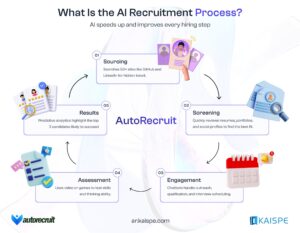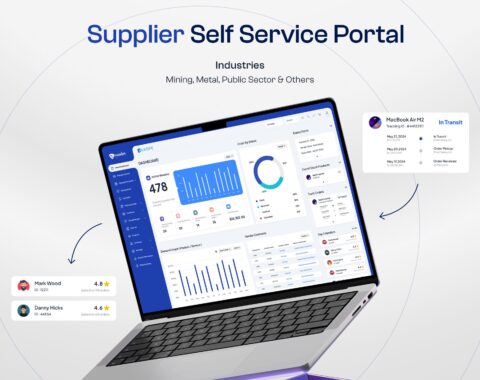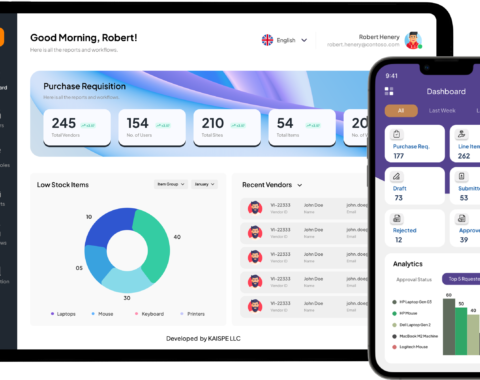AI Recruitment or hiring in the modern context is just so frustrating. Each job posting in a company attracts over 250 resumes on average and this makes human resource departments overwhelmed with job applications (SHRM), but not anymore with HR auto recruitment applications.
Directly as a result of such a dilemma, AI hiring has gained popularity. McKinsey states that AI will reduce recruitment time to a maximum of 75%. The Harvard Business Review study shows that AI screening eliminates 89% of the unconscious bias, whereas IBM research indicates a 30% drop in cost-per-hire.
This leads to quicker recruiting processes, less overhead and more equitable assessment of talent, so that companies can hire smarter rather than harder.

How Is AI Used in Recruitment?
Core AI Recruitment Applications
AI recruiting is an integrated suite of technology that optimizes hiring at every level, not just one tool or strategy.
| Technology | Function | AI in Recruitment Examples |
| NLP Chatbots | 24/7 candidate interaction | Mya Systems handles 75% of screening conversations autonomously |
| Predictive Analytics | Forecast hiring success | Unilever uses AI to predict candidate success with 85% accuracy |
| Video Interview AI | Analyze tone, facial cues, and voice | HireVue evaluates 25K+ data points per interview session |
| Resume Parsing | Match skills to roles instantly | Beamery parses over 10M profiles weekly for fit and engagement |
What Is the AI Recruitment Process?
AI enhances each phase of hiring with speed and intelligence:
- Sourcing: AI searches more than 50 sites, such as Stack Overflow, GitHub, and LinkedIn, to find untapped and passive talent.
- Screening: In only a few seconds, intelligent algorithms examine portfolios, resumes, and social media posts to determine whether they fit a position.
- Engagement: AI chatbots eliminate repetitive chores for recruiters by reaching out, qualifying, and scheduling interviews.
- Assessment: Video or game-based tests measure communication, problem-solving, and cognitive capacity.
- Results showed that: The top three candidates with the highest chance of success are revealed using predictive analytics.
This AI recruitment process delivers fast, data-backed, and bias-reduced hiring at scale.
What Is the AI Recruiting Strategy?
An effective AI recruiting strategy blends automation with recruiter oversight to deliver optimal outcomes. The key pillars include:
- Data-Driven Hiring: AI models are trained using past hiring data to improve position matching.
- Continuous Optimization: Feedback loops that gradually enhance bias filters and sourcing algorithms.
- Human-AI Collaboration: Instead of reviewing resumes by hand, recruiters now use AI to evaluate their results.
The end result is a hybrid paradigm where human expertise informs final judgments and AI recruitment tools handle the heavy work, resulting in quicker and more intelligent hires.
Top AI Recruitment Tools (2024 Edition)
Here are the most advanced AI recruitment software platforms redefining how global enterprises hire:
Top 5 AI Recruitment Software Tools
- Phenom: Enterprise-grade AI talent marketplace optimizing internal mobility.
- Eightfold.ai: Uses deep learning to uncover hidden talent and reduce bias.
- HireEZ: Formerly Hiretual, it powers Boolean and semantic search across all web platforms.
- SeekOut: Known for diversity hiring and deep candidate profiling.
- Fetcher: Automates candidate outreach using machine learning and analytics.
Specialized AI Recruitment Tools
- Skillate: Real-time scoring based on skill-match and contextual fit.
- Humanly.io: Focused on ethical, bias-aware conversational AI screening.
- Clovers: Interview intelligence platform using sentiment and behavior analysis.
Each tool solves a specific bottleneck in the AI recruitment process, from sourcing to selection.
What Companies Use AI in Recruitment?
Some of the world’s most competitive employers have embraced AI-driven hiring:
Case 1: Hilton
- Automated 95% of interviews using chatbots and AI scheduling.
- Reduced interview wait time from 2 weeks to just 5 hours.
- Achieved 42% increase in diversity hires.
Case 2: Vodafone
- Used AI to process 1 million+ applications annually.
- Achieved 60% faster shortlisting using predictive analytics and resume parsing.
Case 3: L’Oréal
- Implemented Mya chatbot for global hiring campaigns.
- Handled 1.4 million candidates with automated conversations.
- Boosted candidate experience ratings by 35%.
These AI recruitment examples show that digital transformation is not just possible, it’s essential.
What Is the Future of AI in Recruiting? (2025–2030 Predictions)
The next wave of AI in hiring is both exciting and disruptive. Here’s a glimpse of what’s coming:
Emerging Trends
- Generative AI: Auto-generates highly tailored job descriptions and interview questions.
- Blockchain Verification: Instant checks for degrees, licenses, and certifications.
- Metaverse Interviews: Fully immersive virtual interview environments with AI moderators.
- Emotion AI: Evaluates micro-expressions to predict long-term cultural alignment.
Controversial Developments
- AI “Dating Apps” for Talent: Swipe-right systems for employers and candidates.
- Passive Candidate Monitoring: Tracking online behavior for future role matching.
- Algorithmic Compensation Models: AI predicts salary based on market and performance potential.
The future of AI recruitment isn’t just more automation, it’s deeper personalization, greater transparency, and broader access to opportunity.
How to Implement an AI Recruitment Strategy: A Step-by-Step Guide
Building an AI recruiting capability starts with structure and intention. Here’s a practical roadmap:
Phase 1: Foundation
- Audit current bottlenecks in your recruitment funnel.
- Define KPIs like time-to-fill, diversity ratios, and candidate satisfaction.
Phase 2: Tool Selection
- Choose platforms that integrate with your AI recruitment CRM.
- Prioritize systems with bias-detection mechanisms.
- Ensure tools are compliant with EEOC, OFCCP, GDPR, and CCPA regulations.
Phase 3: Change Management
- Upskill your team, recruiters become “AI handlers,” guiding ethical use.
- Set transparency protocols so candidates know when AI is involved.
- Create feedback loops to refine models over time.
Success in AI recruitment is built not just on tech, but on trust and clarity.
AI Recruitment Companies & Agencies
Many organizations now partner with AI recruitment companies or engage an AI recruitment agency to accelerate transformation.
These firms provide:
- End-to-end recruitment automation services
- Custom AI recruitment software deployment
- Workforce analytics and diversity audits
- Talent pipeline optimization
Examples include HireVue, Wade & Wendy, XOR, and Turing, which serve high-growth tech, retail, and healthcare sectors.
What Are AI Recruitment Jobs?
As adoption grows, demand for AI recruitment jobs is rising. Emerging roles include:
- AI Talent Acquisition Strategist
- AI Systems Trainer for HR
- Recruitment Data Analyst
- Conversational UX Designer (for AI Chatbots)
These positions require a blend of HR experience and tech fluency, marking the rise of hybrid career paths.
AI Recruitment CRM: The Backbone of Smart Hiring
An AI recruitment CRM integrates candidate relationship management with intelligent automation. Unlike traditional applicant tracking systems (ATS), AI CRMs:
- Learn from recruiter behavior
- Automate candidate nurturing
- Provide insights on drop-off points and application funnel optimization
Platforms like Beamery and Avature lead in this space, empowering companies to build long-term talent communities, not just fill jobs.
Ethical Considerations in AI Recruitment
AI doesn’t eliminate human bias, it learns from it. That’s why ethics and oversight are critical.
Must-Have Safeguards
- Bias Audits: Regular model evaluations to detect and mitigate bias
- Human-in-the-Loop: Recruiter oversight at key decision points
- Data Compliance: Respect GDPR/CCPA, especially in candidate data storage
- Transparency: Explainable AI ensures candidates understand how decisions are made
Red Flags to Avoid
- Using biased historical data to train models
- Black box algorithms with no interpretability
- Invasive tools that predict personality traits unethically
Trust is a key factor in employer branding, and ethical AI is a competitive differentiator.
Conclusion: The AI-Human Recruitment Partnership
AI recruitment aims to enhance the capabilities of the recruiters rather than competing with them. Volume, logic and speed are operated by machines. Humans offer their intuition, empathy and judgment.
AI plays a part in the best recruiting procedures, by screening and ranking arousing a prospect, and people confirm on the correctness of suitability as well as the conclusion.
The earliest adopters of AI recruiting experienced a 43 percent increase in retention rates according to a Deloitte study conducted in 2024.
Contact Kaispe today, because in a talent-driven market, artificial intelligence isn’t just a tool, it’s your competitive advantage. Let us help you transform recruitment with smarter, faster, and more efficient hiring solutions.
Next Steps for HR Teams:
- Start small: Pilot a resume parsing or chatbot solution.
- Track KPIs: Time-to-hire, diversity, candidate NPS.
- Scale: Expand successful tools across teams and regions.




